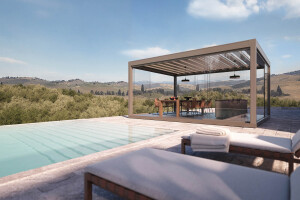Cougnaud Construction is the French leader in industrial modular construction, so when building their 5.000 sq m Cougnaud Campus employee headquarters it was paramount that they cement their sustainability credentials by having the campus serve as its own proof of concept of the benefits of modular construction. To realize this, they collaborated with architecture, engineering, and materials technicians to create an eco-conscious, energy efficient, turnkey, scalable building as an exemplar of the viability of their own construction process.
Cougnaud Construction is the French leader in industrial modular construction, which involves creating properties offsite in factories. Modular construction offers many benefits, from being cost, time, and energy efficient to providing consistent, sustainable, and durable buildings maximized across construction and occupant wellness metrics. When building their 5.000 sq m headquarters, Cougnaud Campus, which was to house their 250 employees, it was paramount that Cougnaud cement their sustainability credentials by having the campus serve as its own proof of concept of the myriad of benefits afforded by modular construction, To realize this, they collaborated with architecture, engineering, and materials technicians to create an eco-conscious, energy efficient, turnkey, scalable building as an exemplar of the viability of their own construction process.
The team began, as with all projects, by gathering data about the site location and type of terrain, the energy needs of the finished building and its future use potentials. These calculations are designed to take into account the full lifecycle of the building before construction begins in order to minimize waste and cost inefficiencies and maximize value and energy efficiency. Digital BIM modelling was used to communicate to stakeholders and construction teams throughout the process, as well as facilitating high volume production of in-factory 3D modules as well as 2D facades which were then assembled on-site in 3D. Factory assembly is a ‘dry’ process which significantly reduces carbon impact through avoiding the water waste typical of traditional construction, as well as improving quality and consistency through verification of performance and compatibility metrics prior to installation.
The roof of the building was waterproofed by Elevate's RubberGard EPDM - a cured, single-ply membrane made of synthetic rubber (Ethylene-Propylene-Diene-
Cougnaud Campus
Compartilhe ou adicione Cougnaud Campus às suas coleções

























